作者:Severin 和 Ian,MT Capital
長話短說
Jito 是 Solana 上第一個提供 MEV 獎勵和質押獎勵的流動性質押協議。 在過去 30 天裡,其 TVL 增加了近 70%,這使其有望重塑 Solana 的質押格局。
Jito 即將推出其治理代幣 JTO。 前期,JTO的流通量將受到限制,拋售壓力主要來自空投用戶。 JTO 的用例有限,價值獲取能力較差。 Jito 需要新的激勵計劃和生態系統的發展來推動 TVL 的持續成長,這可以緩解空投用戶的拋售壓力並保持 JTO 價值的穩定性。
隨著 Solana 上新資產和用戶的湧入,加上交易量的增加和極低的流動性質押滲透率,像 Jito 這樣的 LSD 協議有望捕獲更多的質押 TVL。 Solana 巨大的 MEV 潛力也為 Jito 提供了充足的發展空間。
與 Marinade 相比,Jito 在生態系統廣度、去中心化和質押模型特異性方面的劣勢將隨著時間的推移而減弱。 同時,隨著 Solana 的採用,Jito 在 MEV 價值取得和分配方面的核心競爭優勢將大幅擴大。 我們非常看好 Jito 未來超越 Marinade 成為 Solana 頂級 LSD 協議的前景。
Jito 基本面的增強也將提振 JTO 代幣價格。 看看過去一個月 LSD 代幣的表現,我們相信 JTO 可能會在二級市場看到更驚人的漲幅。
Jito:Solana 上第一個具有 MEV 獎勵的液體質押協議
Jito Labs 深入研究 Solana MEV 領域
Jito Network 由 Jito Labs 團隊推出。 在早期,Jito Labs 專注於 Solana MEV 基礎設施。 2022 年7 月,他們發布了Solana MEV Dashboard,分析了自2022 年1 月以來Solana 上超過360 億筆MEV 交易。隨後,2022 年8 月,Jito Labs 宣布獲得由Multicoin Capital 和Framework Ventures 領投的1000萬美元A 輪融資。 所得收益將繼續為優化 MEV 提取和分配的基礎設施提供資金。
Jito Labs 隨後推出了 Jito-Solana 驗證器用戶端和 Jito Block Engine 等產品,成為主要的 Solana MEV 基礎設施供應商。 Jito 區塊引擎透過鏈下拍賣將中繼者、搜尋者和驗證者連接起來,以緩解 MEV 問題。
首先,Jito 區塊引擎接收來自中繼者的交易訂單並將其轉發給搜尋者。
接下來,搜尋者提交包含出價的交易包。
最後,Jito 區塊引擎模擬不同的交易組合,以找到最佳的套件轉發給驗證器進行處理。

來源: https://www.jito.wtf/blog/jito-block-engine-expands-access-to-all-solana-mev-traders/
According to theValidator Health Report: October 2023released by the Solana Foundation, about 31.45% of Solana validators currently use the Jito-Solana validator client by Jito Labs. This underscores Jito Labs’ technical capabilities in the MEV domain.
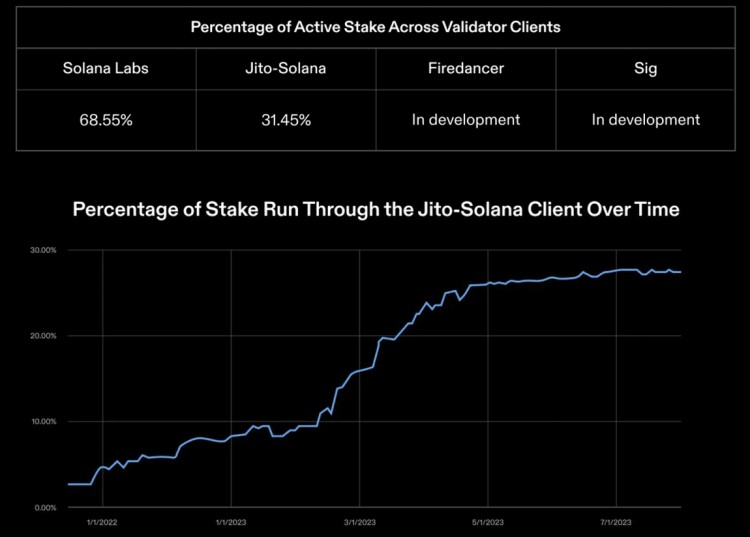
With increasing adoption of the Jito-Solana validator client, more MEV rewards are captured on Jito-Solana, laying the groundwork for Jito to launch liquid staking modules with MEV rewards.
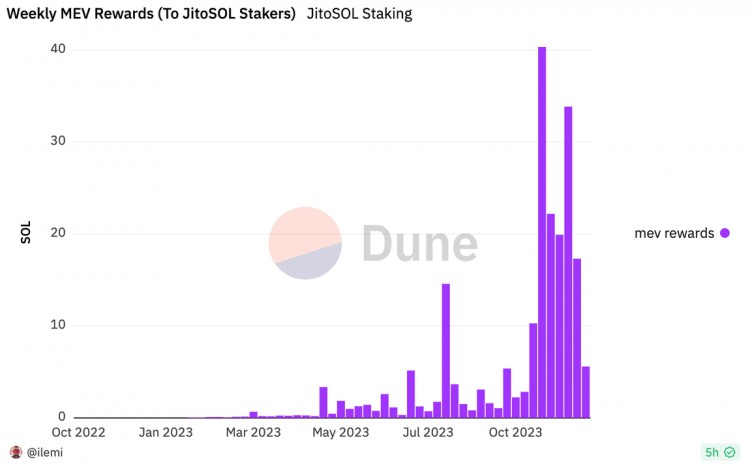
The First Solana LSD Protocol with MEV Rewards
Ill-timed launch leading to lackluster JitoSOL performance:In November 2022, right before FTX imploded, Jito Labs officially launched the Jito staking service to ride the popularity of liquid staking protocols. Similar to other LSDs, users receive JitoSOL tokens as liquidity tokens after delegating SOL to validators. JitoSOL prices appreciate over time to reflect earned validation rewards. Thanks to Jito Labs’ early efforts in Solana MEV, Jito also distributes MEV profits to stakers for extra yields. Unfortunately, right after announcing liquid staking, FTX collapsed due to customer fund misappropriation. The closely-tied Solana ecosystem also took a heavy hit with massive liquidity outflows. Thus, despite launching staking modules, lack of market confidence and liquidity demand kept Jito TVL lukewarm.
Points Program bolstering Jito revival: As the Solana ecosystem recovered in the second half of 2023, Jito’s TVL also started picking up gradually. Concurrently in August 2023, Jito launched Jito Points program to incentivize adoption of JitoSOL. Users earn points through activities like staking with Jito, holding JitoSOL, using JitoSOL in DeFi, and referring friends. Points represent contributions to the Jito community and serve as an important benchmark for future airdrops. The launch of the loyalty program markedly steepened Jito TVL growth.
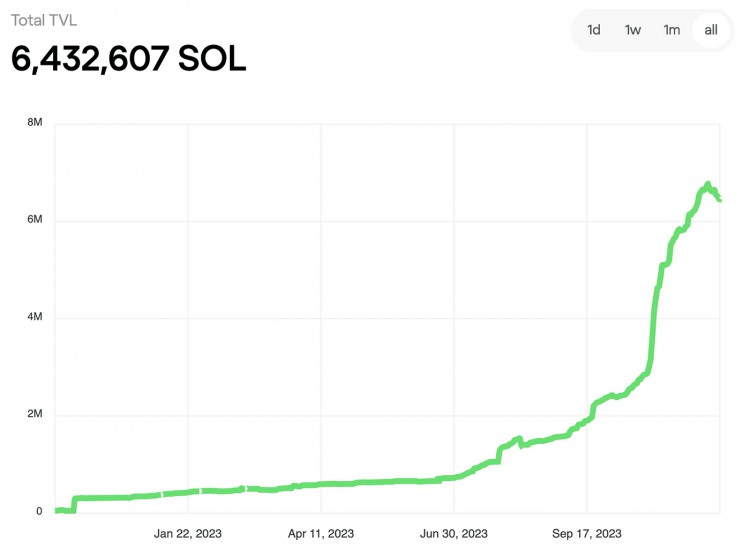
Lido withdrawal accelerating Jito growth through market share capture: Around the same time in October 2023, the Lido DAO community voted to stop supporting new SOL staking deposits, with node operators set to exit the staking market starting November. With Lido bowing out, nearly $6M worth of stSOL needed to find new staking avenues. Jito, offering combined staking and MEV rewards plus a loyalty program, opportunistically onboarded large amounts of stSOL. This further catalyzed Jito TVL growth, propelling Jito to become one of the top 2 LSD protocols on Solana.

source:https://lookerstudio.google.com/u/0/reporting/b41835bc-fafb-46c8-9ade-b012f28a41b2/page/p_7dnjjzu6uc
More Decentralized Jito — StarkNet
To make the underlying validator pool and staked asset allocation more decentralized, Jito proposed the future roadmap for Jito StarkNet. Jito StarkNet is a self-sustaining, transparent, decentralized protocol for intelligently managing validator pools. It consists of three modules — Keepers, Validator History Program, and Steward Program.
The Validator History Program stores historical data for each validator over the past ~3 years, including participation and accuracy in consensus, fee rates, MEV extraction value, total stake value, and staking ranking.
The Steward Program calculates a score and optimal staking allocation for each validator based on on-chain historical records.
The Keepers Network executes staking allocation based on calculations from the Steward Program.
In the Jito StarkNet network, validators’ historical behaviors serve as the sole benchmark for staking allocation to incentivize benign competition and better staking experiences. Also, allocation management no longer relies on centralized governance. Instead, the Steward and Keepers programs autonomously adjust allocations in a more decentralized fashion.
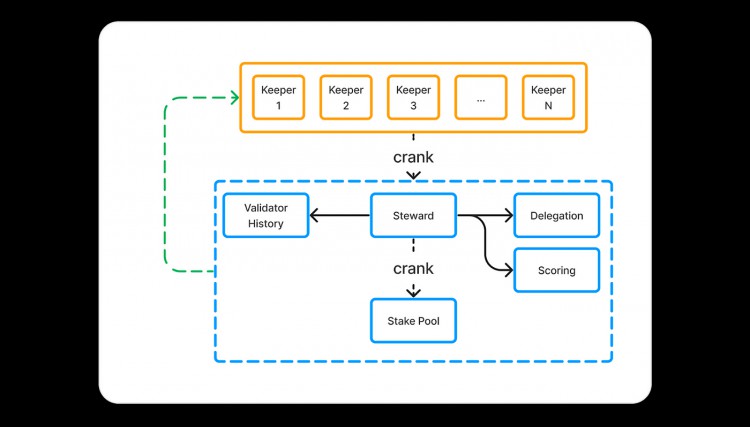
Tokenomics
On November 28th, the Jito Foundation announced the release of JTO governance token. The launch of JTO is a crucial step in Jito’s development, as it will be utilized to reward early contributors through airdrops and empower users with governance capabilities over the protocol.
Token Distribution:Total supply is 1 billion JTO, allocated as:
10% Airdropped to early users
24.3% Community pool governed by the DAO
24.5% and 16.2% to the Jito team and early investors, with a 1-year cliff and 3-year vesting
25% Ecosystem fund
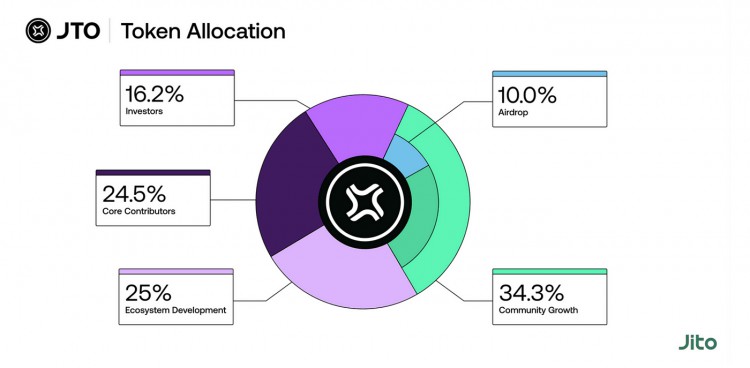
Token Utility: JTO holders can decide on key parameters and governance initiatives like:
Setting fees for the JitoSOL staking pool
Tuning parameters in Jito StarkNet to adjust staking allocation strategies
Managing the DAO’s JTO treasury and fees captured from JitoSOL
Airdrop Incentives: Early Jito adopters stand to earn JTO token airdrops. Specifically,
80% of tokens are airdropped to JitoSOL holders and users
15% of tokens are airdropped to validators running the Jito-Solana client
5% of tokens are airdropped to Jito MEV searchers
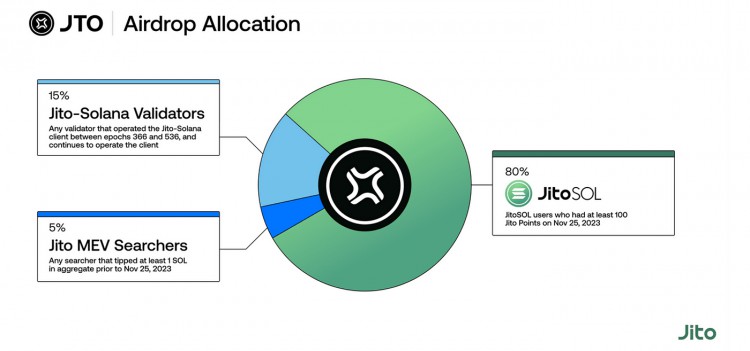
Given the token allocation, there will be limited circulating supply initially, with selling pressure coming mainly from airdropped users. As for utility, JTO use cases are currently limited with inferior value capture capabilities. Jito needs new incentive programs and ecosystem growth to drive continuous TVL increase, which could ease selling pressure from airdropped users and maintain JTO value stability to some extent.
Jito’s Future Outlook
Explosive Solana Growth
After lying low in the fallout from FTX’s bankruptcy, Solana is finally seeing signs of recovery. Starting September 2023, Solana TVL kickstarted exponential growth, recently approaching $700M. Moreover, in the latest bull run, top 10 chain monthly TVL increased 14.8% versus a whopping 85% on Solana — far outpacing peers. The influx of assets bodes well for driving up SOL staking demand.
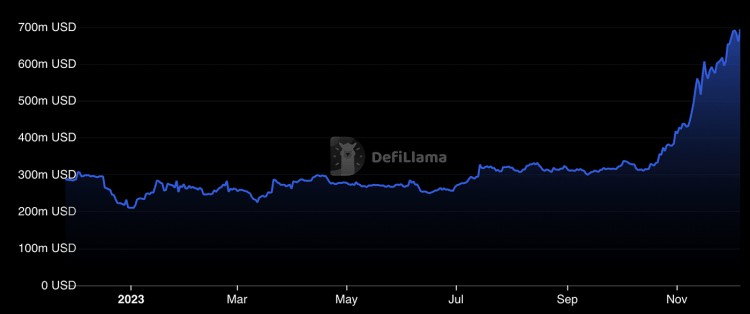
Aside from surging TVL, Solana also hit peaks of nearly 400M in daily transactions. The heightened trading volumes should increase network fees as well as MEV profits to stimulate staking demand for protocols like Jito.
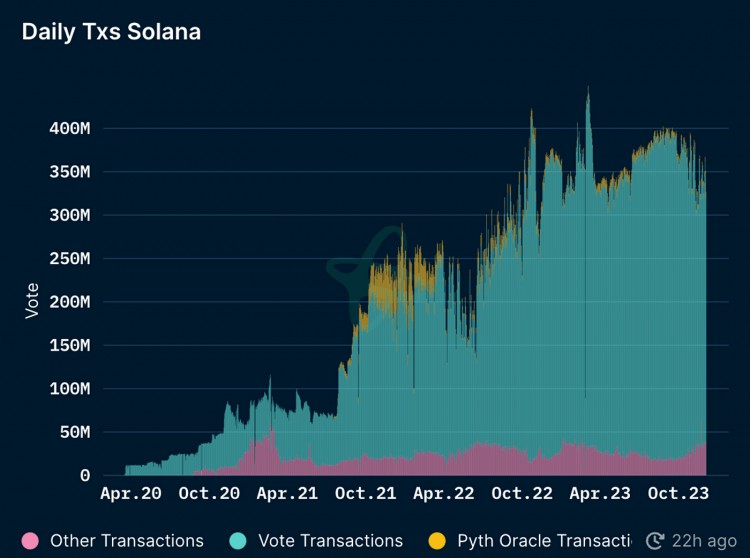
Additionally, Solana also saw increases in new and reactivated users, further expanding the addressable market for LSD protocols like Jito.
Huge Runway for Solana LSD Growth
Despite 70.07% of SOL already staked, liquid staking only accounts for 3–4% — leaving ample room to run. Compared to regular staking, liquid staking offers superior capital efficiency by letting users enjoy staking yields while participating in other DeFi activities with liquidity staking tokens. As depicted below, liquid staking saw explosive growth with the Solana revival. We expect liquid staking to displace more generic staking avenues over time given higher capital efficiency for DeFi activities.
Enormous MEV Potential on Solana
Since Jito distributes MEV profits to JitoSOL holders, higher MEV yields on Solana translate to higher staking rewards for JitoSOL. The boosted APR makes JitoSOL more enticing for users. Over the past year, Solana saw $14M in MEV profits, with ample optimizable MEV left on the table.
As the Solana network thrives, Jito also accumulates higher MEV takings over time. We expect this trend to continue with Jito capturing incrementally more MEV from burgeoning Solana activity to distribute to JitoSOL holders.
Jito Has its Unique Competitive Advantages Compared with Marinade
Marinade, as the earliest LSD protocol in the Solana ecosystem, once disrupted TVL, reaching a peak of 1.7 billion and standing as one of Jito’s major competitors. When compared to Marinade, Jito faces the following key competitive disadvantages:
The ecosystem network of Marinade’s LST is more diverse than that of Jito’s LST.
Marinade has a higher number of validating nodes, resulting in a higher level of decentralization compared to Jito.
Marinade offers additional staking options beyond LSD.
In response to competitive disadvantage 1, as illustrated in the following diagram, JitoSOL is continually expanding its ecosystem use cases and has already integrated with over 10 mainstream DeFi protocols. Moreover, with the solid support of Multicoin, a dedicated player in the Solana ecosystem, Jito is well-positioned to effortlessly expand its ecosystem partnerships in the future.
In response to competitive disadvantage 2, Marinade currently boasts approximately twice the number of nodes compared to Jito, resulting in a significantly higher level of decentralization. This presents a challenge for Jito to surpass in the short term. However, Jito is actively transitioning towards Jito-StarkNet, offering the potential for a substantial increase in protocol decentralization in the future.
In addition to the competitive disadvantages, when compared to Marinade, Jito also possesses the following competitive advantages:
JitoSOL has the ability to capture additional MEV rewards, with staking rewards slightly higher than Marinade.
Under similar incentive programs, Jito can attract a larger number of active users in the current wave of Solana’s recovery.
Jito’s ability to capture and distribute MEV value stands as a core competitive advantage for long-term success. As the Solana network becomes more active, the MEV value will increase, making Jito’s advantage more pronounced. The fact that Jito can attract a larger number of active users also indicates that Marinade has not yet established a monopoly over the LSD market. Similar LSD protocols, including Jito, still have significant room for development.
In summary, compared to Marinade, Jito’s disadvantages in ecosystem breadth, decentralization, and staking model specificity will diminish over time. Meanwhile, Jito’s core competitive advantage in MEV value capture and distribution will expand dramatically with Solana adoption. We are very bullish on Jito’s future prospects to overtake Marinade as Solana’s top LSD protocol.
The stable fundamentals of Jito are expected to drive an upward trend in the secondary token, JTO. Considering the price trends of LSD protocol tokens over the past month, we believe that JTO will also demonstrate a robust performance in the secondary market.
Reference
https://www.jito.network/docs/jitosol/overview/
https://www.jito.network/blog/
https://solana.com/news/validator-health-report-october-2023
https://foresightnews.pro/artic
